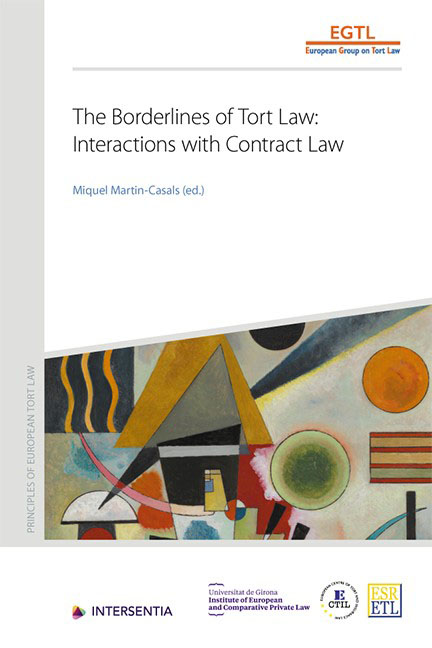Book contents
Spain
Published online by Cambridge University Press: 15 November 2019
Summary
QUESTIONS
TRACING THE BORDERLINES
A. DISTINCTION BETWEEN TORT AND CONTRACT
The Spanish Civil Code (CC) has followed the Franco-Italian model with regard to the classification of the so-called ‘sources’ of obligations, a model which in its turn has its origin in the Institutes of Justinian (I. 3, 13, 2). As is well known, the latter arranged obligations in four classes, namely contractual, quasi-contractual, delictual, and quasi-delictual. The Civil Code devotes its Book 4 to the rules on ‘Obligations and Contracts’. Title I of that Book starts with a set of ‘General Provisions’, among which a rule on ‘sources of obligations’ is included (art 1089), according to which, ‘Obligations arise from the law, from contracts and quasicontracts and from unlawful acts or omissions or those in which there is any kind of fault or negligence’. A similar rule can be found in the private law of the regional civil law of Navarre (art 488 of the ‘Compilation’).
Contract as such is not defined by the Civil Code; however, it is provided that ‘contract exists from the time where one or several persons consent to bind themselves vis- a -vis another or others to give something or to provide a service’ (art 1254). Therefore, the essence of contract is that the parties bind themselves (see also art 1258) and they may thus enforce such agreement as if it was law inter partes (art 1901). The contract is thus lex contractus (as the Decision of the Supreme Court (Sentencia del Tribunal Supremo, STS) 17.10.2001 (RJ 2001, 8641) puts it). By contrast, obligations arising from tort are subject to the tort law provisions in the Civil Code itself (arts 1902 – 1910). Tort is also devoid of statutory definition, however the general rule is that whoever causes damage to another in a negligent way is bound to compensate him (art 1902).
The Spanish Civil Code tackles both kinds of liability in a separate way. Contract law rules are provided for in Book 4, Title II (‘On contracts’, ie arts 1254 – 1886), whereas tort law rules are included in Chapter II (‘On the obligations which arise from fault or negligence’) of Title XVI (‘On the obligations which are created without an agreement’) of the same Book (arts 1902 – 1910).
- Type
- Chapter
- Information
- The Borderlines of Tort LawInteractions with Contract Law, pp. 507 - 568Publisher: IntersentiaPrint publication year: 2019



